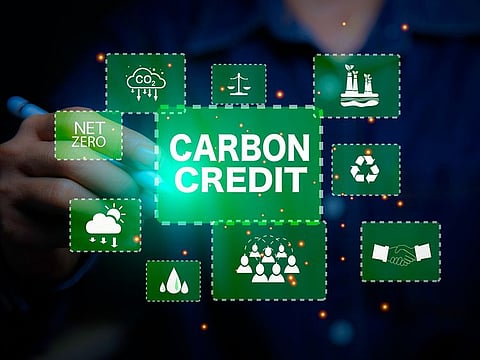Dubai Financial Market starts ambitious pilot testing of carbon credit trades – and it hopes to make a difference
DFM CEO Hamed Ali puts full weight of Dubai’s capital markets behind carbon credit

Dubai: The Dubai Financial Market is not done with just having one of its best years, as IPOs and heavy investor activity drive volumes – and, of course, sentiments.
Today, the DFM has gone live with a still emerging type of financial instrument – carbon credits. A pilot progam will run until December 11, with the DEWA and 17 other UAE corporate blue-chips taking on the pioneering role.
‘Carbon credits’ are issued to companies – typically in industry and manufacturing - whereby their carbon emissions as part of their operations can only be up to a certain level. This level is then brought down gradually.
Now, if the company with the carbon credit does not use these in full, they can trade it to another company who does need it. And for which they get suitably compensated. (It happens extensively in the global auto industry, and Tesla has been a major beneficiary by selling unused credit to other carmakers.)
What all of this does is incentivize companies to reduce their emissions– and profit from them where possible. And once real progress is made, all of this adds up to doing more towards Net Zero targets.
To gauge what all of this means for DFM specifically, Hamed Ali, CEO of DFM (and Nasdaq Dubai) gives an overview of the highlights.
The DFM trading will be based on DEWA and other companies supplying the carbon credits. Will you, when the project goes fully operational, allow others to sell as well?
DFM acknowledges the significance of broadening participation in the carbon credit trading platform.
While the initial pilot program involves carbon credits supplied from DEWA, First Abu Dhabi Bank and MyCarbon, our vision for the project's full operation includes welcoming other entities to sell on the platform.
We believe in fostering a diverse marketplace that encourages various contributors to engage in carbon reduction initiatives. As the project evolves, we anticipate expanding the range of participating companies and carbon credit suppliers.
Currently, 17 companies have signed up with DFM on the pilot project. All of these are some of the biggest corporate entities in the country. As of now, is carbon trading more of a big boys’ venture?
The participation of prominent corporate entities in the pilot project reflects the initial momentum of the pilot. While the current engagement includes major companies, it is essential to note that carbon trading is not exclusively reserved for larger corporations.
DFM envisions the carbon credit trading platform as an inclusive space, and as the project progresses, we anticipate the active involvement of companies of various sizes, aligning with our commitment to creating a diverse and accessible marketplace for carbon reduction initiatives.
The pilot phase serves as a foundational step, and our goal is to encourage broader industry participation as the platform evolves.
In other markets, carbon credit programs have gone live - but offtake hasn’t been particularly heavy. In your opinion, what’s holding it back? Awareness?
The uptake of carbon credit programs can be influenced by various factors in different markets. While awareness is a crucial element, several dynamics contribute to the pace of adoption.
Market maturity, regulatory frameworks, and industry readiness are significant considerations. It's essential to recognize that the success of carbon credit programs often depends on a combination of factors.
DFM is committed to actively promoting awareness and creating an environment conducive to robust participation in carbon credit trading. As the platform evolves, we anticipate increased interest and engagement from various stakeholders, contributing to the growth of the carbon credit market.
Did DFM have to bring in special processes that would allow these trades?
Yes, DFM has implemented specialized processes to facilitate carbon credit trades within the platform. The development of this initiative involved the introduction of unique protocols and procedures tailored to the intricacies of carbon credit trading.
These processes ensure the seamless execution, clearing, settlement and offsetting of carbon credits - while adhering to the regulatory standards and environmental integrity essential for carbon credit markets.
Once it goes big and wide, what additional top ups do you plan to add to the current program?
While specific details of future enhancements will be determined based on market dynamics and participant feedback, potential additions may include broadening the range of eligible projects, incorporating new carbon credit suppliers, and enhancing trading features.
DFM aims to remain responsive to the evolving landscape of carbon markets, ensuring that the platform continues to meet the needs of participants and contributes effectively to the goals of climate action and sustainability.
We will keep stakeholders informed about any planned top-ups and improvements as the platform matures.
Sign up for the Daily Briefing
Get the latest news and updates straight to your inbox







